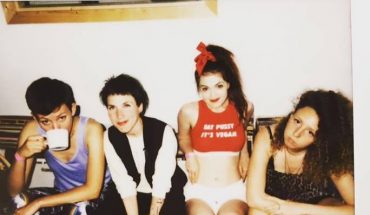Joni Michell: Both Sides Now is a collection of original conversations between Malka Marom and Joni Mitchell. They are lifted from three interviews that took place in 1973, 1979 and 2012.
In the introduction Malka explains how she came to bond with Joni and forged a lasting friendship over the decades. Malka herself is an interesting character. The broadcast journalist who was once part of the music duo, Malka and Joso, came across Joni in a Toronto coffee bar in 1966. Marom immediately recognised Mitchell as a talent to be reckoned with. In turn Joni recognised Malka as someone who she could trust with her thoughts. Perhaps this is why the conversations are so enlightening and candid. A mutual respect floods the pages as Malka gets Joni to open up on a manner of all topics.
Littered throughout the book are song lyrics, images and paintings created by Mitchell including ‘Turbulent Indigo’ where Mitchell depicted herself as Van Gogh (a painter whose struggle she identifies with when the press would not recognise her growth as an artist).
Through the conversations we learn of Joni’s childhood including contracting polio which isolates her from her parents. Joni appears to have a strained relationship with her mother. Her mother ostracises her for not completing her piano lessons, even after Joni has established herself in the field of music. We learn that Mitchell has lived through poverty and wealth and embraces all kinds of fates as it makes her who she is: “I mean, I feel every bit of trouble I went through. I’m grateful for it, you know? I wouldn’t have pursued music but for trouble”
Mitchell also comes across as a strong individual in the recording studio, refusing to bow to conventions to get the sound and results that she felt were necessary for her music output. Yet despite coming across as an independent character she is not a feminist: “I was never a feminist. I was in argument with them. They were so down on the domestic female, the family, and it was breaking down. And even though my problems were somewhat female, they were of no help to mine. I was already past that”.
Mitchell feels a kinship with Billie Holiday due to Billie’s “world –weariness”. She sings the praises of Emeli Sande: “She’s a great new talent, the first one I’ve heard in twenty-something years” but she frowns on entertainers like Beyonce when her name is mentioned: “It’s decadent. It’s tragic really. That should be the rotten underbelly of culture…The sediment has risen to the top. It’s not a graceful culture. I guess I have an appetite for grace, which is not in vogue”
Mitchell definitely comes across as an individual not belonging to anything or anyone, not even her own country: “I’m a person outside every box there is, pretty much”.
It prompts Marom to ask Michell if she is lonely. We learn that sometimes Joni feels alone but she cannot form an alliance with anything. We learn that she hates being called a singer and worse, a folk singer. When Malka asks Joni what she would like to be called she says: “You’d have to hyphenate”.
What a wonderful response for one thing that really stands out in these conversations is that Joni cannot be pigeonholed. Her individuality will not allow it.
It ends with Mitchell saying that she enjoys life in the spurts of health that she has. I could not help but think of her current health status as I read this. Life’s troubles made this amazing individual who she is. Get better, Joni. The world is not as colourful without you.
Joni Mitchell: Both Sides Now – Conversations with Malka Marom is out now on Omnibus Press
Mary Hand
@MaryBHand





